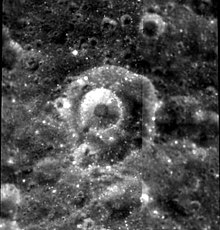| Coordinates | 28°48′N 126°36′E / 28.8°N 126.6°E |
|---|---|
| Diameter | 31 km |
| Depth | Unknown |
| Colongitude | 234° at sunrise |
| Eponym | Felicjan Kępiński |

Kepinski is a lunar impact crater on the Moon's far side. It lies to the northwest of the larger crater Vernadskiy, and northeast of Meggers. Its name comes from Polish astronomer Felicjan Kępiński.
Kepinski has an outer rim that is marginally eroded due to subsequent impacts, especially along the southwest side. The inner walls are relatively featureless, sloping down to the interior. The floor is prominently occupied by a concentric, bowl-shaped crater. This feature is offset slightly to the northwest of Kepinski's midpoint. The diameter of this concentric feature is less than half that of Kepinski, although it also has a small outer rampart.
Satellite craters
By convention these features are identified on lunar maps by placing the letter on the side of the crater midpoint that is closest to Kepinski.
| Kepinski | Latitude | Longitude | Diameter |
|---|---|---|---|
| C | 30.2° N | 128.0° E | 20 km |
| N | 26.6° N | 126.2° E | 40 km |
| W | 30.1° N | 124.9° E | 25 km |
References
- Andersson, L. E.; Whitaker, E. A. (1982). NASA Catalogue of Lunar Nomenclature. NASA RP-1097.
- Blue, Jennifer (July 25, 2007). "Gazetteer of Planetary Nomenclature". USGS. Retrieved 2007-08-05.
- Bussey, B.; Spudis, P. (2004). The Clementine Atlas of the Moon. New York: Cambridge University Press. ISBN 978-0-521-81528-4.
- Cocks, Elijah E.; Cocks, Josiah C. (1995). Who's Who on the Moon: A Biographical Dictionary of Lunar Nomenclature. Tudor Publishers. ISBN 978-0-936389-27-1.
- McDowell, Jonathan (July 15, 2007). "Lunar Nomenclature". Jonathan's Space Report. Retrieved 2007-10-24.
- Menzel, D. H.; Minnaert, M.; Levin, B.; Dollfus, A.; Bell, B. (1971). "Report on Lunar Nomenclature by the Working Group of Commission 17 of the IAU". Space Science Reviews. 12 (2): 136–186. Bibcode: 1971SSRv...12..136M. doi: 10.1007/BF00171763. S2CID 122125855.
- Moore, Patrick (2001). On the Moon. Sterling Publishing Co. ISBN 978-0-304-35469-6.
- Price, Fred W. (1988). The Moon Observer's Handbook. Cambridge University Press. ISBN 978-0-521-33500-3.
- Rükl, Antonín (1990). Atlas of the Moon. Kalmbach Books. ISBN 978-0-913135-17-4.
- Webb, Rev. T. W. (1962). Celestial Objects for Common Telescopes (6th revised ed.). Dover. ISBN 978-0-486-20917-3.
- Whitaker, Ewen A. (1999). Mapping and Naming the Moon. Cambridge University Press. ISBN 978-0-521-62248-6.
- Wlasuk, Peter T. (2000). Observing the Moon. Springer. ISBN 978-1-85233-193-1.
| Coordinates | 28°48′N 126°36′E / 28.8°N 126.6°E |
|---|---|
| Diameter | 31 km |
| Depth | Unknown |
| Colongitude | 234° at sunrise |
| Eponym | Felicjan Kępiński |

Kepinski is a lunar impact crater on the Moon's far side. It lies to the northwest of the larger crater Vernadskiy, and northeast of Meggers. Its name comes from Polish astronomer Felicjan Kępiński.
Kepinski has an outer rim that is marginally eroded due to subsequent impacts, especially along the southwest side. The inner walls are relatively featureless, sloping down to the interior. The floor is prominently occupied by a concentric, bowl-shaped crater. This feature is offset slightly to the northwest of Kepinski's midpoint. The diameter of this concentric feature is less than half that of Kepinski, although it also has a small outer rampart.
Satellite craters
By convention these features are identified on lunar maps by placing the letter on the side of the crater midpoint that is closest to Kepinski.
| Kepinski | Latitude | Longitude | Diameter |
|---|---|---|---|
| C | 30.2° N | 128.0° E | 20 km |
| N | 26.6° N | 126.2° E | 40 km |
| W | 30.1° N | 124.9° E | 25 km |
References
- Andersson, L. E.; Whitaker, E. A. (1982). NASA Catalogue of Lunar Nomenclature. NASA RP-1097.
- Blue, Jennifer (July 25, 2007). "Gazetteer of Planetary Nomenclature". USGS. Retrieved 2007-08-05.
- Bussey, B.; Spudis, P. (2004). The Clementine Atlas of the Moon. New York: Cambridge University Press. ISBN 978-0-521-81528-4.
- Cocks, Elijah E.; Cocks, Josiah C. (1995). Who's Who on the Moon: A Biographical Dictionary of Lunar Nomenclature. Tudor Publishers. ISBN 978-0-936389-27-1.
- McDowell, Jonathan (July 15, 2007). "Lunar Nomenclature". Jonathan's Space Report. Retrieved 2007-10-24.
- Menzel, D. H.; Minnaert, M.; Levin, B.; Dollfus, A.; Bell, B. (1971). "Report on Lunar Nomenclature by the Working Group of Commission 17 of the IAU". Space Science Reviews. 12 (2): 136–186. Bibcode: 1971SSRv...12..136M. doi: 10.1007/BF00171763. S2CID 122125855.
- Moore, Patrick (2001). On the Moon. Sterling Publishing Co. ISBN 978-0-304-35469-6.
- Price, Fred W. (1988). The Moon Observer's Handbook. Cambridge University Press. ISBN 978-0-521-33500-3.
- Rükl, Antonín (1990). Atlas of the Moon. Kalmbach Books. ISBN 978-0-913135-17-4.
- Webb, Rev. T. W. (1962). Celestial Objects for Common Telescopes (6th revised ed.). Dover. ISBN 978-0-486-20917-3.
- Whitaker, Ewen A. (1999). Mapping and Naming the Moon. Cambridge University Press. ISBN 978-0-521-62248-6.
- Wlasuk, Peter T. (2000). Observing the Moon. Springer. ISBN 978-1-85233-193-1.